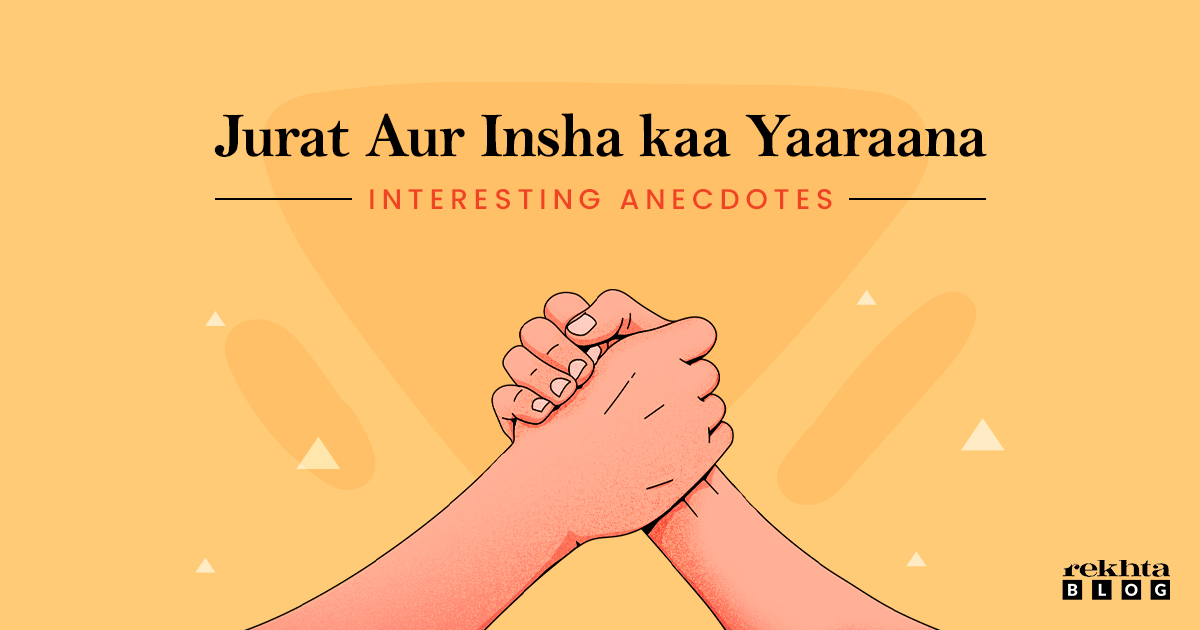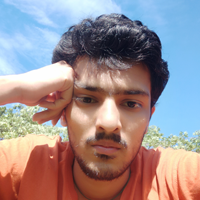
Jurat Aur Insha ka Yaaraana: Interesting Anecdotes
Born in Delhi, in the year 1748, Yahya Aman, better known as the poet Jurat Qalandar Bakhsh was unlike any other poet of his time. Known for an artful portrayal of mischief, mirth and mockery in his poetry, Jurat, was defined as a ‘skirt-chasing poet’ by none other than Mir Taqi Mir. Brought up in Faizabad and then relocated to Lucknow, this storied figure has several anecdotes to accredit his name, the most prominent amongst which is his incredulous blindness.
It is a common insight that Jurat, lost his eyesight in the prime of his youth. Although, what is a little dubious is the fact that there are quite a few contrasting justifications that make this ‘insight’ apocryphal. Some accounts reveal that he complained of cataracts at a very early age, which eventually resulted in blindness, while others dispute this by declaring that he suffered an attack of Smallpox, which was incurable in those days. Scandalously, the grapevine even suggests that Jurat, wittingly feigned his blindness- why- so he could freely visit the quarters of the women who lived in Pardas.
Whatever the case might be, the poet in him certainly painted such colours of love and romance that no other poet, blind or sighted, ever saw. One fitting reason for this accomplishment could be the lively, jovial and witty temperament that made both him and his poetry unique.
Jurat, who was also a masterful astrologer, was celebrated for his humorous narration of incidents, and thus, was a constant presence in the gatherings of the nobles of Lucknow of that time. Another prominent figure who was invariably beside Jurat in these gatherings was his friend, Sayyad Insha Allah Khan ‘Insha’. A noted poet otherwise, Insha, was implicitly consigned to the task of lifting up and carrying a drunk, passed away Jurat to his home.
Muhammad Husain Azad, in his book Aab-e-Hayaat, has recorded a very interesting episode involving the two of them. Here is how it goes:
On another one of those everyday visits to his friend’s house, Sayyad Insha saw a rather unfamiliar site- Jurat with his head bowed and brows frowned was thinking deeply about something. Curious at this unusual setting, Insha, hastily asked, ‘What are you thinking about?’
Jurʾat, still in the state of absorption, responded, ‘A line has occurred to me. I want it to become an opening verse.’ More inquisitive than ever, Insha, peeked again, ‘What is the line?’ Jurat gingerly replied, ‘It’s a good line, but until I have a second line I won’t recite it. Otherwise, you’ll put a second line on it and snatch it away too!’ Insha, now seeming acutely trying, pestered over and over again, to which Jurat finally answered:
us zulf pe phabtī shab-e-dījūr kī sūjhī
(It came to me to call the tresses a long dark night)
Listening to it, Insha added an instant rejoinder:
andhe ko añdhere meñ baḌī duur kī sūjhī
(The blind man in the darkness had such farsight!)
Heeding to it in one moment, Jurat, broke into a peal of uncontrollable laughter the other. And, once he came to himself, he ran amusingly behind Insha with his walking stick. Insha dodged around successfully for some time until Jurat, finally groped him from behind and the two friends surrendered to further guffaws.
Another delightful memory that these two left for us is a riddle that Insha made based on Jurat’s name. Let’s see if you can guess it:
sarmūñḍī nigoṛī gujrātan
Got it? No? Okay, here’s a hint, it relates to the Urdu Rasm-ul-Khat (script), the manner in which a word is written.
If you guessed it, great! If not, don’t dampen your spirits, we’ll unriddle it for you!
If the word gujrātan is made sarmūñḍī [=head-cut] by the removal of its first letter, ‘G’ gāf, and then is made nigoṛī [=without-foot] by the removal of its last letter, ‘N’ nūn, the remaining letters spell out the name Jurʾat. Another subtlety in this riddle is that Gujrātan was the name of Jurʾat’s mother.
There is an old Arabic saying: Poets are pupils of God. Whether they really are or not, dear reader, we leave it to you.
And if you’d like to check out more of Jurat’s works Rekhta is the place to be!
NEWSLETTER
Enter your email address to follow this blog and receive notification of new posts.




